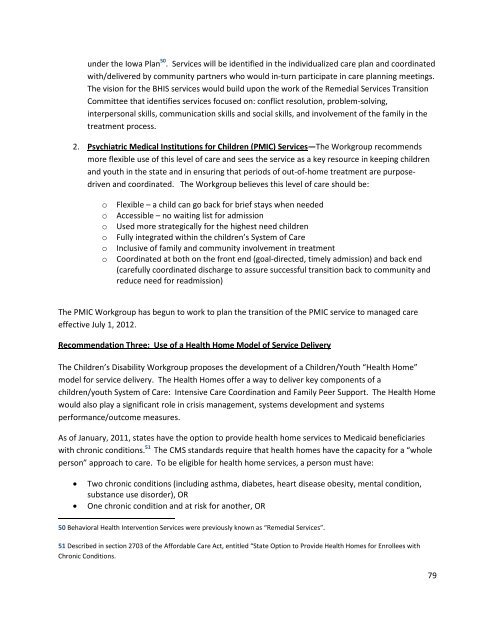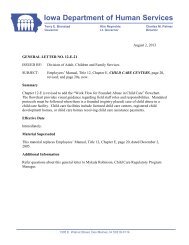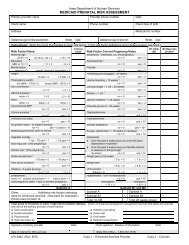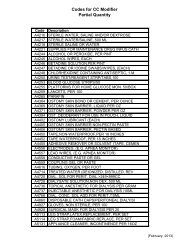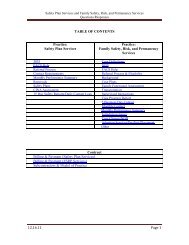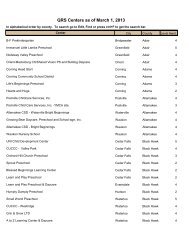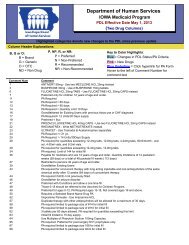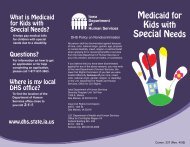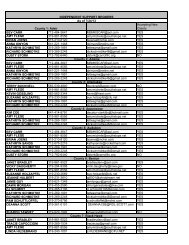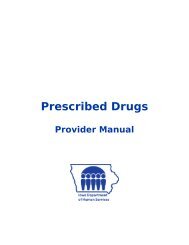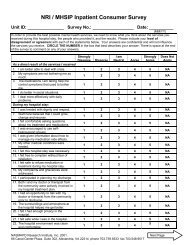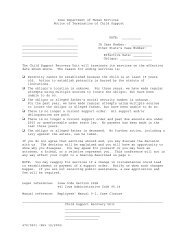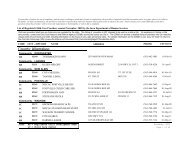Iowa Mental Health and Disability Services System Redesign Interim ...
Iowa Mental Health and Disability Services System Redesign Interim ...
Iowa Mental Health and Disability Services System Redesign Interim ...
- No tags were found...
You also want an ePaper? Increase the reach of your titles
YUMPU automatically turns print PDFs into web optimized ePapers that Google loves.
under the <strong>Iowa</strong> Plan 50 . <strong>Services</strong> will be identified in the individualized care plan <strong>and</strong> coordinated<br />
with/delivered by community partners who would in-turn participate in care planning meetings.<br />
The vision for the BHIS services would build upon the work of the Remedial <strong>Services</strong> Transition<br />
Committee that identifies services focused on: conflict resolution, problem-solving,<br />
interpersonal skills, communication skills <strong>and</strong> social skills, <strong>and</strong> involvement of the family in the<br />
treatment process.<br />
2. Psychiatric Medical Institutions for Children (PMIC) <strong>Services</strong>—The Workgroup recommends<br />
more flexible use of this level of care <strong>and</strong> sees the service as a key resource in keeping children<br />
<strong>and</strong> youth in the state <strong>and</strong> in ensuring that periods of out-of-home treatment are purposedriven<br />
<strong>and</strong> coordinated. The Workgroup believes this level of care should be:<br />
o<br />
o<br />
o<br />
o<br />
o<br />
o<br />
Flexible – a child can go back for brief stays when needed<br />
Accessible – no waiting list for admission<br />
Used more strategically for the highest need children<br />
Fully integrated within the children’s <strong>System</strong> of Care<br />
Inclusive of family <strong>and</strong> community involvement in treatment<br />
Coordinated at both on the front end (goal-directed, timely admission) <strong>and</strong> back end<br />
(carefully coordinated discharge to assure successful transition back to community <strong>and</strong><br />
reduce need for readmission)<br />
The PMIC Workgroup has begun to work to plan the transition of the PMIC service to managed care<br />
effective July 1, 2012.<br />
Recommendation Three: Use of a <strong>Health</strong> Home Model of Service Delivery<br />
The Children’s <strong>Disability</strong> Workgroup proposes the development of a Children/Youth “<strong>Health</strong> Home”<br />
model for service delivery. The <strong>Health</strong> Homes offer a way to deliver key components of a<br />
children/youth <strong>System</strong> of Care: Intensive Care Coordination <strong>and</strong> Family Peer Support. The <strong>Health</strong> Home<br />
would also play a significant role in crisis management, systems development <strong>and</strong> systems<br />
performance/outcome measures.<br />
As of January, 2011, states have the option to provide health home services to Medicaid beneficiaries<br />
with chronic conditions. 51 The CMS st<strong>and</strong>ards require that health homes have the capacity for a “whole<br />
person” approach to care. To be eligible for health home services, a person must have:<br />
• Two chronic conditions (including asthma, diabetes, heart disease obesity, mental condition,<br />
substance use disorder), OR<br />
• One chronic condition <strong>and</strong> at risk for another, OR<br />
50 Behavioral <strong>Health</strong> Intervention <strong>Services</strong> were previously known as “Remedial <strong>Services</strong>”.<br />
51 Described in section 2703 of the Affordable Care Act, entitled “State Option to Provide <strong>Health</strong> Homes for Enrollees with<br />
Chronic Conditions.<br />
79


